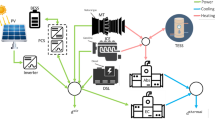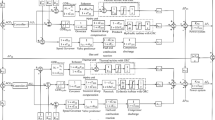Abstract
Solving the optimal reactive dispatch (ORPD) is a strenuous task to assign the best operating point of the electrical system components to obtain the most secure and stable state of system. This problem became more complex problem due the variation of the load demand or inclusion the renewable energy resources (RERs). The aim of this paper is solving the ORPD problem using a modified jellyfish search optimizer (MJSO) under deterministic and probabilistic states of the load demand and the RERs. The MJSO is based on boosting the exploration and exploitation phases of the standard jellyfish search optimizer (JSO) using two strategies. The first strategy is enhancing the exploration process by using a chaotic mutation while the second strategy is implemented for the exploitation process using a spiral orientation motion of the populations around the sorted jellyfish. Three uncertain parameters are considered including the load demand, the solar irradiance, and the wind speed which are represented using the Weibull, the Beta, and the normal probability density functions, respectively. The Monte Carlo simulation along with scenario-based reduction to generate a set of scenarios for the stochastic ORPD. To verify the effectiveness of the MJSO for solving the ORPD problem, it is tested on IEEE 30-bus system and the obtained results are compared with other well-known optimization techniques. The obtained results and the comparison with other techniques indicate that the proposed MJSO algorithm provides effective and robust high-quality solution when solving the ORPD at deterministic state. In addition of that the expected power loss is decreased considerably with application the proposed technique for solving the ORPD at stochastic state.














Similar content being viewed by others
Abbreviations
- ALO:
-
Ant Lion Optimizer
- BBO:
-
Biogeography-Based Optimization
- CSA:
-
Cuckoo Search Algorithm
- PSO:
-
Particle Swarm Optimization
- CLPSO:
-
Comprehensive Learning PSO
- DE:
-
Differential Evolution
- FA:
-
Firefly algorithm
- GSA:
-
Gravitational Search Algorithm
- GSA-CSS:
-
Gravitational Search Algorithm Conditional Selection Strategies
- HSA:
-
Harmony Search Algorithm
- TS:
-
Tabu Search
- HPSO–TS:
-
Hybrid PSO with the TS
- SA:
-
Simulated annealing
- SSA:
-
Salp Swarm Algorithm
- HSSSA:
-
Hybrid SSA and SA
- IPG-PSO:
-
Improved Pseudo-Gradient PSO
- ISSO:
-
Improved Social Spider Optimization
- IDE:
-
Improved DE
- JA:
-
Jaya Algorithm
- IGSA-CSS:
-
Improved GSA-CSS
- IALO:
-
Improved Antlion Optimization
- MSSA:
-
Modified Salp Swarm Algorithm
- QOTLBO:
-
Teaching Learning-based Optimization
- PSO-TAC:
-
PSO and Time Acceleration Coefficients
- PSO-TIW:
-
PSO and Time Inertia Weight
- PG-PSO:
-
PSO and Pseudo-Gradient Search
- PSO-CF:
-
PSO and Constriction Factor
- SPSO-TAC:
-
PSO and Time Acceleration Coefficients
- PSO-TAC:
-
PSO and Time Acceleration Coefficients
- SGA:
-
Specialized Genetic Algorithm
- SCA:
-
Sine Cosine Algorithm
- SSO:
-
Social Spider Optimization
- STGA:
-
Standard Genetic Algorithm
- QTLBO:
-
Quasi-oppositional TLBO
- WOA:
-
Whale optimization algorithm
References
Terra L, Short M (1991) Security-constrained reactive power dispatch. IEEE Trans Power Syst 6(1):109–117
Quintana V, Santos-Nieto M (1989) Reactive-power dispatch by successive quadratic programming. IEEE Trans Energy Convers 4(3):425–435
Lee K, Park Y, Ortiz J (1985) A united approach to optimal real and reactive power dispatch. IEEE Trans Power Appar Syst 5:1147–1153
Granville S (1994) Optimal reactive dispatch through interior point methods. IEEE Trans Power Syst 9(1):136–146
Abdel-Fatah S, Ebeed M, Kamel S, Nasrat L (2019) Moth swarm algorithm for reactive power dispatch considering stochastic nature of renewable energy generation and load. In: 2019 21st International Middle East Power Systems Conference (MEPCON), pp 594–599: IEEE
Ebeed M, Alhejji A, Kamel S, Jurado F (2020) Solving the optimal reactive power dispatch using marine predators algorithm considering the uncertainties in load and wind-solar generation systems. Energies 13(17):4316
Khan NH, Wang Y, Tian D, Jamal R, Ebeed M, Deng Q (2020) Fractional PSOGSA algorithm approach to solve optimal reactive power dispatch problems with uncertainty of renewable energy resources. IEEE Access 8:215399–215413
Khan NH, Wang Y, Tian D, Jamal R, Kamel S, Ebeed M (2021) Optimal siting and sizing of sssc using modified salp swarm algorithm considering optimal reactive power dispatch problem. IEEE Access 9:49249–49266
Kamel S, Abdel-Fatah S, Ebeed M, Yu J, Xie K, Zhao C (2019) Solving optimal reactive power dispatch problem considering load uncertainty. In: 2019 IEEE Innovative Smart Grid Technologies-Asia (ISGT Asia), pp 1335–1340: IEEE
Mahadevan K, Kannan P (2010) Comprehensive learning particle swarm optimization for reactive power dispatch. Appl Soft Comput 10(2):641–652
Li Z, Cao Y, Dai LV, Yang X, Nguyen TT (2019) Finding solutions for optimal reactive power dispatch problem by a novel improved antlion optimization algorithm. Energies 12(15):2968
Nguyen TT, Vo DN (2019) Improved social spider optimization algorithm for optimal reactive power dispatch problem with different objectives. Neural Comput Appl 32(10):5919–5950
Villa-Acevedo WM, López-Lezama JM, Valencia-Velásquez JA (2018) A novel constraint handling approach for the optimal reactive power dispatch problem. Energies 11(9):2352
Abou El Ela A, Abido M, Spea S (2011) Differential evolution algorithm for optimal reactive power dispatch. Electric Power Syst Res 81(2):458–464
Prasad D, Banerjee A, Singh RP (2019) Optimal reactive power dispatch using modified differential evolution algorithm. In: Advances in computer, communication and control, Springer, pp 275–283
Abido MA (2006) Multiobjective optimal VAR dispatch using strength pareto evolutionary algorithm. In: 2006 IEEE International conference on evolutionary computation, pp 730–736: IEEE
Wu QH, Ma J (1995) Power system optimal reactive power dispatch using evolutionary programming. IEEE Trans Power Syst 10(3):1243–1249
Shaheen AM, El-Sehiemy RA, Farrag SM (2016) Integrated strategies of backtracking search optimizer for solving reactive power dispatch problem. IEEE Syst J 12(1):424–433
Mandal B, Roy PK (2013) Optimal reactive power dispatch using quasi-oppositional teaching learning based optimization. Int J Electr Power Energy Syst 53:123–134
Khazali A, Kalantar M (2011) Optimal reactive power dispatch based on harmony search algorithm. Int J Electr Power Energy Syst 33(3):684–692
Heidari AA, Abbaspour RA, Jordehi AR (2017) Gaussian bare-bones water cycle algorithm for optimal reactive power dispatch in electrical power systems. Appl Soft Comput 57:657–671
Ebeed M, Ali A, Mosaad MI, Kamel S (2020) An improved lightning attachment procedure optimizer for optimal reactive power dispatch with uncertainty in renewable energy resources. IEEE Access 8:168721–168731
Chen G, Liu L, Zhang Z, Huang S (2017) Optimal reactive power dispatch by improved GSA-based algorithm with the novel strategies to handle constraints. Appl Soft Comput 50:58–70
Abdel-Fatah S, Ebeed M, Kamel S (2019) Optimal reactive power dispatch using modified sine cosine algorithm. In: 2019 International Conference on Innovative Trends in Computer Engineering (ITCE), pp 510–514: IEEE
Ramadan A, Ebeed M, Kamel S, Nasrat L (2021) Optimal power flow for distribution systems with uncertainty. In: Uncertainties in modern power systems. Academic Press, pp 145–162
Oda ES, Abd El Hamed AM, Ali A, Elbaset AA, Abd El Sattar M, Ebeed M (2021) Stochastic optimal planning of distribution system considering integrated photovoltaic-based DG and DSTATCOM under uncertainties of loads and solar irradiance. IEEE Access 9:26541–26555
Abdel-Fatah S, Ebeed M, Kamel S, Yu J (2019) Reactive power dispatch solution with optimal installation of renewable energy resources considering uncertainties. In: 2019 IEEE Conference on power electronics and renewable energy (CPERE), pp 118–123: IEEE
Mohseni-Bonab SM, Rabiee A, Mohammadi-Ivatloo B (2016) Voltage stability constrained multi-objective optimal reactive power dispatch under load and wind power uncertainties: a stochastic approach. Renew Energy 85:598–609
Naidji M, Boudour M (2020) Stochastic multi-objective optimal reactive power dispatch considering load and renewable energy sources uncertainties: a case study of the Adrar isolated power system. Int Trans Electr Energy Syst 30(6):e12374
Chou J-S, Truong D-N (2021) A novel metaheuristic optimizer inspired by behavior of jellyfish in ocean. Appl Math Comput 389:125535
Gouda EA, Kotb MF, El-Fergany AA (2021) Jellyfish search algorithm for extracting unknown parameters of PEM fuel cell models: Steady-state performance and analysis. Energy 221:119836
Chou J-S, Truong D-N, Kuo C-C (2021) Imaging time-series with features to enable visual recognition of regional energy consumption by bio-inspired optimization of deep learning. Energy 224:120100
Abdel-Basset M, Mohamed R, Chakrabortty RK, Ryan MJ, El-Fergany A (2021) An improved artificial jellyfish search optimizer for parameter identification of photovoltaic models. Energies 14(7):1867
Durmus A, Kurban R, Karakose E (2021) A comparison of swarm-based optimization algorithms in linear antenna array synthesis. J Comput Electr 20(4):1520–1531
Chou J-S, Truong D-N, Le T-L, Truong TTH (2021) Bio-inspired optimization of weighted-feature machine learning for strength property prediction of fiber-reinforced soil. Expert Syst Appl 180:115042
Saddique MS et al (2020) Solution to optimal reactive power dispatch in transmission system using meta-heuristic techniques-Status and technological review. Electr Power Syst Res 178:106031
Wu Q, Cao Y, Wen J (1998) Optimal reactive power dispatch using an adaptive genetic algorithm. Int J Electr Power Energy Syst 20(8):563–569
Liang R-H, Liao J-H (2007) A fuzzy-optimization approach for generation scheduling with wind and solar energy systems. IEEE Trans Power Syst 22(4):1665–1674
Reddy SS, Bijwe P, Abhyankar AR (2014) Real-time economic dispatch considering renewable power generation variability and uncertainty over scheduling period. IEEE Syst J 9(4):1440–1451
Biswas PP, Suganthan PN, Mallipeddi R, Amaratunga GAJASC (2019) Optimal reactive power dispatch with uncertainties in load demand and renewable energy sources. Appl Soft Comput 75:616–632
Contreras-Reyes JE (2021) Fisher information and uncertainty principle for skew-gaussian random variables. Fluct Noise Lett 20(05):2150039
Fossette S et al (2015) Current-oriented swimming by jellyfish and its role in bloom maintenance. Curr Biol 25(3):342–347
Mariottini GL, Pane L (2010) Mediterranean jellyfish venoms: a review on scyphomedusae. Mar Drugs 8(4):1122–1152
Condon RH et al (2013) Recurrent jellyfish blooms are a consequence of global oscillations. Proc Natl Acad Sci 110(3):1000–1005
Shi L, Luo Y, Tu GJIJOEP, Systems E (2014) Bidding strategy of microgrid with consideration of uncertainty for participating in power market. Int J Electr Power Energy Syst 59:1–13
Growe-Kuska N, Heitsch H, Romisch W (2003) Scenario reduction and scenario tree construction for power management problems. In: 2003 IEEE Bologna Power Tech Conference Proceedings, vol. 3, p. 7 pp. Vol. 3: IEEE
Kennedy J, Eberhart R (1995) Particle swarm optimization. In: Proceedings of ICNN'95-international conference on neural networks, vol 4. IEEE, pp 1942–1948
Mirjalili SJAIES (2015) The ant lion optimizer. Adv Eng Softw 83:80–98
Mirjalili S, Lewis AJAIES (2016) The whale optimization algorithm. Adv Eng Softw 95:51–67
Mirjalili SJK-BS (2016) SCA: a sine cosine algorithm for solving optimization problems. Knowl Based Syst 96:120–133
Yadav P, Tiwari V, Bhowmick S (2021) A novel firing angle-based power-flow model of TCSC. In: Recent advances in power systems. Springer, pp 109–115
Taher SA, Amooshahi MK (2012) New approach for optimal UPFC placement using hybrid immune algorithm in electric power systems. Int J Electr Power Energy Syst 43(1):899–909
Polprasert J, Ongsakul W, Dieu VN (2016) Optimal reactive power dispatch using improved pseudo-gradient search particle swarm optimization. Electr Power Compon Syst 44(5):518–532
Wakif A, Animasaun I, Narayana PS, Sarojamma G (2020) Meta-analysis on thermo-migration of tiny/nano-sized particles in the motion of various fluids. Chin J Phys 68:293–307
Animasaun IL, Shah NA, Wakif A, Mahanthesh B, Sivaraj R, Koriko OK (2022) Ratio of momentum diffusivity to thermal diffusivity: introduction, Meta-Analysis, and Scrutinization. Chapman & Hall
Mandal S, Mandal K, Kumar S (2017) A new optimization technique for optimal reactive power scheduling using Jaya algorithm. In: 2017 Innovations in power and advanced computing technologies (i-PACT). IEEE, pp 1–5
Mouassa S, Bouktir T, Salhi AJES, Technology AIJ (2017) Ant lion optimizer for solving optimal reactive power dispatch problem in power systems. Eng Sci Technol Int J 20(3):885–895
Rajan A, Malakar T (2015) Optimal reactive power dispatch using hybrid Nelder-Mead simplex based firefly algorithm. Int J Electr Power Energy Syst 66:9–24
Sahli Z, Hamouda A, Bekrar A, Trentesaux D (2018) Reactive power dispatch optimization with voltage profile improvement using an efficient hybrid algorithm. Energies 11(8):2134
ben oualid Medani K, Sayah S, Bekrar A (2018) Whale optimization algorithm based optimal reactive power dispatch: a case study of the Algerian power system. Electr Power Syst Res 163:696–705
Mohseni-Bonab SM, Rabiee A, Distribution (2017) Optimal reactive power dispatch: a review, and a new stochastic voltage stability constrained multi-objective model at the presence of uncertain wind power generation. J IET Generat Transm 11(4):815–829
Biswas PP, Suganthan PN, Mallipeddi R, Amaratunga GA (2019) Optimal reactive power dispatch with uncertainties in load demand and renewable energy sources adopting scenario-based approach. Appl Soft Comput 75:616–632
Acknowledgements
The authors extend their appreciation to the Deputyship for Research & Innovation, Ministry of Education in Saudi Arabia for funding this work through the projects DSR2020-02-493
Author information
Authors and Affiliations
Corresponding author
Ethics declarations
Conflict of interest
The authors of the article have no relationship (either financial or personal) with any people or organizations that can affect or bias the paper's contents.
Additional information
Publisher's Note
Springer Nature remains neutral with regard to jurisdictional claims in published maps and institutional affiliations.
Rights and permissions
About this article
Cite this article
Gami, F., Alrowaili, Z.A., Ezzeldien, M. et al. Stochastic optimal reactive power dispatch at varying time of load demand and renewable energsy resources using an efficient modified jellyfish optimizer. Neural Comput & Applic 34, 20395–20410 (2022). https://doi.org/10.1007/s00521-022-07526-5
Received:
Accepted:
Published:
Issue Date:
DOI: https://doi.org/10.1007/s00521-022-07526-5




